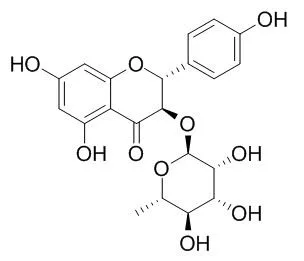| In vitro: |
| J Agric Food Chem. 2011 May 11;59(9):4562-9. | | Isolation and characterization of two flavonoids, engeletin and astilbin, from the leaves of Engelhardia roxburghiana and their potential anti-inflammatory properties.[Pubmed: 21476602] | Engeletin, a flavonoid compound, was isolated from the leaves of Engelhardia roxburghiana for the first time, along with astilbin, another flavonoid.
METHODS AND RESULTS:
The chemical structures of Engeletin and astilbin were confirmed by (1)H and (13)C nuclear magnetic resonance (NMR) and mass spectrometry (MS) spectra, and their anti-inflammatory activities were studied in lipopolysaccharide (LPS)-stimulated mouse J774A.1 macrophage cells. LPS induced the inflammatory state in macrophage cells and increased mRNA expressions of pro-inflammatory cytokines. Engeletin and astilbin exhibited remarkable inhibitory effects on interleukin (IL)-1β and IL-6 mRNA expression. Significant inhibition of LPS-mediated mRNA expressions were also seen in LPS binding toll-like receptor (TLR)-4, pro-inflammatory cytokine tumor necrosis factor (TNF)-α, IL-10, chemoattractant monocyte chemotactic protein (MCP)-1, and cyclooxygenase (COX)-2 genes.
CONCLUSIONS:
The reduced expression of these cytokines may alleviate immune response and reduce inflammatory activation, indicating that Engeletin and astilbin may serve as potential anti-inflammatory agents. | | Asian Pac J Allergy Immunol. 2012 Dec;30(4):268-74. | | An in vitro inhibitory effect on RAW 264.7 cells by anti-inflammatory compounds from Smilax corbularia Kunth.[Pubmed: 23393906] | Smilax corbularia is a Thai medicinal plant locally known as 'Hua-Khao-Yen Neua', which is used for treating inflammatory conditions.
To evaluate the anti-inflammatory effect of S. corbularia extracts and its isolated compounds by determination of inhibitory effects on lipopolysaccharide-stimulated PGE2 release, and TNF-alpha and NO production from RAW 264.7 cells.
METHODS AND RESULTS:
The inhibitory effect of aqueous and ethanolic extracts of this plant were determined on LPS-induced NO production, TNF-alpha and PGE2 release in RAW 264.7 cells, as an in vitro indication of possible anti-inflammatory activity. The compounds from active extract were isolated by bioassay-guided fractionation.
Only the ethanolic extract of this plant inhibited TNF-alpha and NO production, with IC50 values of 61.97, and 83.90 microg/ml respectively. Three flavonols, Engeletin, astilbin and quercetin were isolated from the ethanolic extract. quercetin possessed the highest inhibitory effect on NO production with IC50 11.2 microg/ml (37.1 microM), whereas Engeletin and astilbin had no activity (IC50 >100 microg/ml). All three flavonols possessed potent inhibition of PGE2 release with IC50 values of 14.4, 19.6 and 19.9 microg/ml (33.2, 43.5 and 65.8 microM) respectively. Quercetin also exhibited the highest inhibitory effect on TNF-alpha production (IC50 = 1.25 microg/ml or 4.14 microM), but Engeletin and astilbin had no activity.
CONCLUSIONS:
This is the first report of isolated compounds from S. corbularia with potential anti-inflammatory effects, and the results support the use of this plant by Thai traditional doctors for treatment of inflammatory diseases. |
|
| In vivo: |
| J Agric Food Chem. 2016 Aug 10;64(31):6171-8. | | Engeletin Alleviates Lipopolysaccharide-Induced Endometritis in Mice by Inhibiting TLR4-mediated NF-κB Activation.[Pubmed: 27411287 ] | Engeletin (dihydrokaempferol 3-rhamnoside) is a flavanonol glycoside. It can be found in the skin of white grapes and white wine and is widely distributed in southeast Asia, and the leaves are used in a tea. Here, we explored the impact of Engeletin against the inflammatory reaction in a lipopolysaccharide (LPS)-induced endometritis mouse model.
METHODS AND RESULTS:
Engeletin treatment significantly attenuated uterus damage and decreased myeloperoxidase activity. ELISA and qPCR assays showed that Engeletin dose-dependently suppressed the expression of TNF-α, IL-1β, and IL-6. Molecular studies also demonstrated that the levels of iNOS, COX-2, and TLR4, along with their downstream molecules MyD88, IRAK1, TRAF6, and TAK1, were also suppressed by Engeletin. In addition, Engeletin treatment inhibited NF-κB signaling-pathway activation. Moreover, immunofluorescence analysis demonstrated that Engeletin suppressed NF-κB-p65 nuclear translocation.
CONCLUSIONS:
These data indicated the protective action of Engeletin against LPS-stimulated endometritis in mice via negative regulation of pro-inflammatory mediators via the TLR4-regulated NF-κB pathway. |
|






 Cell. 2018 Jan 11;172(1-2):249-261.e12. doi: 10.1016/j.cell.2017.12.019.IF=36.216(2019)
Cell. 2018 Jan 11;172(1-2):249-261.e12. doi: 10.1016/j.cell.2017.12.019.IF=36.216(2019) Cell Metab. 2020 Mar 3;31(3):534-548.e5. doi: 10.1016/j.cmet.2020.01.002.IF=22.415(2019)
Cell Metab. 2020 Mar 3;31(3):534-548.e5. doi: 10.1016/j.cmet.2020.01.002.IF=22.415(2019) Mol Cell. 2017 Nov 16;68(4):673-685.e6. doi: 10.1016/j.molcel.2017.10.022.IF=14.548(2019)
Mol Cell. 2017 Nov 16;68(4):673-685.e6. doi: 10.1016/j.molcel.2017.10.022.IF=14.548(2019)